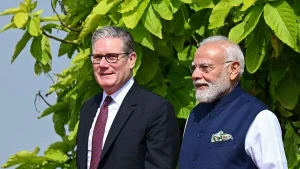Mumbai – Prime Minister Narendra Modi emphasized that the India-UK partnership serves as a crucial pillar of global stability and economic progress during an era marked by international instability. This statement came after comprehensive talks with British Prime Minister Keir Starmer on Thursday, focusing on enhanced cooperation across trade, investment, defence, and technology sectors.
Starmer arrived in Mumbai’s financial hub on Wednesday, leading a substantial 126-strong trade delegation for a strategic two-day visit aimed at bolstering business ties and attracting investments. The visit occurred three months after India and the United Kingdom concluded a free trade agreement following years of intermittent negotiations, accelerated by geo-economic uncertainties stemming from Donald Trump administration’s tariff policies in the United States.
Comprehensive Economic and Trade Agreement

Both leaders celebrated the Comprehensive Economic and Trade Agreement (CETA), highlighting its transformative potential for the India-UK partnership. The agreement promises to reduce tariffs significantly, expand market access for businesses in both nations, stimulate bilateral trade, generate employment opportunities, and deliver benefits to industries and consumers across India and the United Kingdom.
Modi articulated the natural synergy between the two nations, stating that India and the UK are natural partners whose relationship is founded on shared democratic values, freedom, and rule of law. He emphasized that in today’s era of global uncertainty, their growing partnership represents an important pillar supporting global stability and economic advancement.
Technology Security Initiative

The leaders announced groundbreaking initiatives under the Technology Security Initiative (TSI) to propel the India-UK partnership forward in critical technological domains. New cooperation frameworks were established in telecommunications, critical minerals, artificial intelligence, and health technology sectors.
Under the TSI, both nations agreed to establish an Industry Guild and a Supply Chain Observatory specifically dedicated to cooperation on critical minerals. Additionally, they created the Climate Technology Startup Fund designed to support innovators from both countries working at the intersection of climate technology and artificial intelligence.
Modi noted that India’s dynamism combined with the UK’s expertise creates a unique synergy, making their partnership trustworthy and driven by talent and technology. Starmer emphasized the creation of a modern partnership focused on future opportunities, acknowledging India’s remarkable growth trajectory.
Defence and Security Collaboration


Defence cooperation emerged as a cornerstone of the strengthened India-UK partnership, with both leaders announcing significant initiatives for security collaboration. An agreement was signed for government-to-government supply of lightweight multirole missile (LMM) systems, designed to enhance India’s air defence capabilities and support long-term collaboration on complex weapons systems.
Modi highlighted the deepening defence cooperation, noting movement towards defence co-production and connecting the defence industries of both nations. A landmark arrangement was finalized whereby Indian Air Force instructors will be integrated with the Royal Air Force, facilitating knowledge exchange and operational coordination.
The joint statement revealed plans to establish a Regional Maritime Security Centre of Excellence (RMSCE) under the Indo-Pacific Oceans Initiative (IPOI). Both sides will also finalize an inter-governmental agreement on developing maritime electric propulsion systems for Indian warships.
Viksit Bharat Vision
Starmer committed the United Kingdom to partnering with India on the government’s ambitious vision of “Viksit Bharat” or a developed India by 2047. This commitment demonstrates the long-term strategic nature of the India-UK partnership and the UK’s investment in India’s developmental trajectory.
The two countries pledged to deepen cooperation through the TSI with new commitments spanning artificial intelligence, advanced communications, and defence technologies, positioning the partnership at the forefront of technological innovation.
Counter-Terrorism Cooperation
Both prime ministers strongly condemned all forms of terrorism, calling for zero tolerance and concerted global efforts to combat terrorism comprehensively. The India-UK partnership on security extends to countering radicalization and violent extremism, combating terror financing, preventing cross-border movement of terrorists, and enhancing information-sharing mechanisms.
The joint statement specifically condemned in the strongest terms the April 2025 terrorist attack in Pahalgam, Jammu and Kashmir. Both leaders committed to strengthening cooperation for decisive and concerted actions against globally proscribed terrorists, terror entities, and their sponsors, while enhancing bilateral and multilateral cooperation at the United Nations and Financial Action Task Force.
Higher Education Expansion
The India-UK partnership in higher education witnessed significant expansion with nine leading British universities opening campuses in India. The University of Southampton established a campus in Gurugram, while Indian authorities cleared branch campuses for the University of Liverpool, University of York, University of Aberdeen, and University of Bristol.
Queen’s University of Belfast and Coventry University received clearance to open campuses in GIFT City. Additionally, Lancaster University received a Letter of Intent for a Bengaluru campus, and the University of Surrey obtained in-principle approval for a GIFT City campus.
With India currently hosting 40 million university students and requiring 70 million places by 2035, the UK’s higher education sector anticipates a £50-million economic boost from this expansion.
Regional and Global Issues
In this recent India-UK partnership, the leaders discussed critical regional and global issues including Indo-Pacific dynamics, West Asia peace and stability, and the Ukraine conflict. Modi reiterated India’s support for efforts to restore peace through dialogue and diplomacy regarding Ukraine and Gaza, while expressing full commitment to enhancing maritime security cooperation in the Indo-Pacific region.
Starmer welcomed the Gaza peace plan agreement, emphasizing implementation without delay accompanied by immediate lifting of restrictions on humanitarian aid. Their meeting coincided with Konkan 2025, a joint naval exercise involving a British carrier strike group and Indian warships, demonstrating the operational depth of the India-UK partnership.

